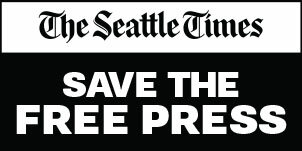This year began with a series of bleak stories about the predicament of local news in America, but there are bright spots.
One is in Philadelphia, where the Lenfest Institute for Journalism keeps finding ways to expand local and regional coverage and generate helpful ideas for the industry.

Lenfest recently published a report on its impact in 2023, which is inspiring for those hoping local journalism finds ways to survive and thrive.
It was also an opportunity for me to have another conversation with Jim Friedlich, Lenfest’s CEO and executive director, about the industry, possible solutions and how to broaden coverage in this year of disruption and election rancor.
The nonprofit, started with a $20 million donation from a cable entrepreneur in 2016, has become a sort of research and development program in the birthplace of America’s democracy.
Lenfest experiments with ways to sustain news organizations and launch new ones, and organizes national events to share findings and help outlets learn from each other.
Friedlich describes it as having concentric circles, with The Philadelphia Inquirer at the center. Lenfest owns the daily newspaper and operates it as a for-profit subsidiary.
The next ring includes a nonprofit, statewide news startup co-founded by Lenfest called Spotlight PA that shares its reporting with more than 100 outlets.
Further out are national programs supporting new and existing news operations. For example, with the Texas Tribune, Spotlight PA and Lenfest formed a collective of 36 statewide news organizations in 26 states. They meet virtually to share “challenges, accomplishments, failures, opportunities and threats,” Friedlich said.
Lenfest emphasizes collaboration and leveraging charity. One of its gatherings spawned Press Forward, the $500 million and growing philanthropic fund to save local news.
Lenfest also convened a group of dailies, including this one, to chart a course away from print and toward a digital future, which I’m less enthusiastic about.
It does all this at relatively low cost. Last year it provided $13.5 million in grants and raised $11.2 million from 3,000 donors. Of that, $6.5 million went to the Inquirer, $2.5 million to Philadelphia’s local news ecosystem and $3.9 million to fund Spotlight PA.
The report also described a project that I hope other cities emulate.
For an election to choose Philadelphia’s 100th mayor last year, Lenfest orchestrated a citywide effort to raise awareness of issues at stake and increase voter engagement.
“In that sense it was a really happy year,” Friedlich said. “A new model and a new level of collaboration was kind of born and grew up.”
More than 70 news organizations and community groups participated in “Every Voice, Every Vote.” It was anchored by a public opinion survey identifying residents’ top issues. That led to front-page Inquirer stories about issues such as public safety and potential solutions.
Lenfest’s report quoted Reverend Luis Cortes, CEO of the community organization Esperanza: “Never in the city’s history have there been so many mayor forums or so much news coverage on so many topics critical to the future of our city.”
“The impact of that was really significant,” Friedlich said. “It allowed multiple news organizations to cover the issues that Philadelphians cared about as well as, or more so, than the horse race between the candidates.”
The project, started by another local foundation, will be extended for two more years. Its next focus will be on accountability and civic engagement, “following through on the pre election work into the coverage of a new administration, and how people can get involved and make their voices heard,” Friedlich said.
Many local papers are cutting coverage of federal issues as they look to reduce costs and focus on their local franchise. Friedlich believes this is a mistake and they should look for ways to increase engagement during this presidential election year.
“We think the best and most effective national election coverage will be a patchwork quilt of strong local coverage,” he said.
Pennsylvania is one of the key swing states, he noted, and recent elections have come down to a few tens of thousands of votes.
“What happens on the ground with coverage of Biden and Trump as it applies to Philadelphia, as it applies to Pittsburgh, as it applies to Lancaster, as it applies to Scranton, will have a meaningful and potentially decisive impact,” he said.
Independent voters who “are still making up their minds trust their local news more than any other source,” he said. “So we’re committed to deeper coverage, deeper engagement and deeper involvement in local races and local coverage.”
Cities with only a ghost newspaper running wire stories and pablum may think this is a fantasy.
But successful models make the case that local news is not a lost cause, if committed local owners and community support are found. All will benefit if federal support comes through, especially places lacking the resources of big coastal cities.
They also show there’s still demand for quality coverage that, at its best, continues to engage voters and bring communities together to address major issues.
How can people reconcile this with bleak industry news?
“I hope the message, that people should take away, is that local news has never been more important and has never faced greater headwinds,” Friedlich said. “The way to reconcile that is to do something about it.”
He suggests civic-minded, local executives and investors invest in local news outlets. Others can subscribe to their local newspaper or support new news organizations.
“Philadelphia does not have to be a unicorn,” he said. “The money involved is not unlike what goes into a well-funded orchestra or regional hospital or a well-supported local university.”
I’d add that concerned citizens can also keep writing to their state and federal elected officials and urge them to intervene and help save local news, which Friedlich described as “the vital gasoline that drives democracy.”
Brier Dudley on Twitter: @BrierDudley is editor of The Seattle Times Save the Free Press Initiative. Its weekly newsletter: https://st.news/FreePressNewsletter. Reach him at bdudley@seattletimes.com.